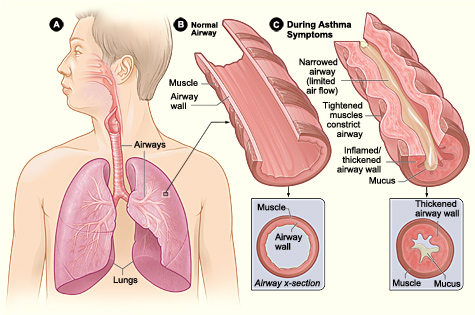
Relationship between Asthma and Psychological Factors
There is a strong relationship between asthma and psychological distress. People with asthma are more likely to experience anxiety, depression, and other mental health problems. This is thought to be due to the chronic nature of the condition and the stress that comes with managing it. There is also a link between asthma and post-traumatic stress disorder (PTSD). This is likely because Asthma can be a trigger for PTSD symptoms.
What are the psychological causes of asthma?
There is no one answer to this question as the psychological causes of asthma can vary from person to person. However, some experts believe that stress and anxiety can play a role in triggering asthma attacks. It’s thought that these emotions can cause the airways to constrict, making it difficult to breathe. Other possible psychological causes of asthma include depression and post-traumatic stress disorder (PTSD). If you’re struggling with asthma, it’s important to talk to your doctor about any psychological factors that may be contributing to your condition.
What is the primary physiological issue in asthma?
The primary physiological issue in asthma is bronchoconstriction, which is the tightening of the smooth muscles around the airways. This results in less air being able to flow through and can lead to wheezing, coughing, and difficulty breathing. Bronchoconstriction is often triggered by allergens or irritants, such as dust, pollen, smoke, or cold air.
What are the Psychological factors affect asthma?
Research suggests that psychological factors can affect asthma. One study found that anxiety and depression were associated with an increase in asthma symptoms. Other studies have found that stress can trigger asthma attacks. It is not clear exactly how these factors affect asthma, but it is thought that they may play a role in the development and severity of the condition.
How psychology is involved at various stages of Asthma such as at the initial onset of symptoms, diagnosis, and ongoing management of symptoms and treatments?

Asthma is a chronic respiratory disease that causes difficulty in breathing, coughing, and wheezing. An asthma attack is considered a medical emergency. An incomplete success of asthma treatment may depend on the presence and interaction of different causes related to the disease itself (Baiardini, et al. 2015).
- Triggers, comorbidities, and asthma phenotype
- Inadequate treatment and inadequate inhaler device
- The patient-related causes such as socio-demographic factors, adherence, and knowledge
- The physician-related reasons such as lack of consciousness as well as familiarity with guidelines
Is asthma caused by psychological factors?
There are different psychological factors involved at each stage of asthma, such as at the initial onset of symptoms, diagnosis, and ongoing management of symptoms and treatments. Psychological factors can influence a patient’s perception of the disease, the impact it has on the patient’s day to day life, as well as the interpretation of symptoms. Symptoms’ subjective perception, alexithymia, coping strategies, depression, and anxiety are examples of the psychological factors that, in cognitive or emotional dimensions most involved in Asthma experience and management (Baiardini, et al.2015).
Symptoms’ subjective perception: A study by Lurie shows that there s a vast difference between how a patient determines the severity of their illness and the doctor’s assessment of the condition. According to another study, patients with high negative emotionality report more dyspnea than others. The accuracy of symptom perception depends on a wide variety of cognitive and affective variables. Variables include emotional state, previous life experiences, attributions, contextual information, attentional and learning processes, expectations, and prior asthma experiences. And also personality traits, and psychopathologic disturbances (Baiardini, et al. 2015).
Coping Strategies
Coping strategies address disease management directly according to a cross-sectional survey involving 6,474 patients who explored coping in asthma management. About one-half of the patients described an active coping strategy, while a similar percentage of patients used a cynical approach. Patients chose to rely on fate or faith more frequently.
Depression and Anxiety
According to Baiardini et al, the presence of psychiatric and psychological symptoms is associated with increased severity of asthma symptomatology. Children and teens with asthma symptoms show a variety of mental health problems, and depression is significantly worse in severe asthma cases. A cross-sectional study conducted at the Asthma Outpatient Clinic of the Federal University of São Paulo Hospital in São Paulo shows how the prevalence of anxiety is higher in asthma patients with uncontrolled asthma than in those with controlled asthma.
How does mental health affect asthma?
Based on various studies conducted to identify the psychological characteristics of asthmatic patients, the conclusion was that asthma patients with mental problems had a higher level of asthma severity and poor control. And also, the psychological characteristics of asthmatic patients influence symptoms’ recognition, daily management, and disease outcomes.
Further, there are multiple behavioural changes a family member or friend can make to help a patient with asthma. While everyone responds differently to chronic illnesses, providing emotional support to manage effectively, is beneficial to the patient. Another way someone can help is by helping to identify, reduce, eliminate, control, or avoid asthma triggers.
References:
- Supporting friends or colleagues with asthma. (n.d.). (URL)
- Baiardini, I., Sicuro, F., Balbi, F. et al. Psychological aspects in asthma: do psychological factors affect asthma management?. asthma res and Pract 1, 7 (2015). (URL)
- 06 Advantages of Structuralism in Psychology

- Understanding Depression: A Guide to Resources and Self-Care

- Mastering Positive Thinking: Conquer Negative Thoughts

- Pros and Cons of Structuralism and Functionalism

- Locus of Control

This article is written by:
I leverage my educational and professional background in Business, Public Relations, Human Rights to fuel my passion in blogging.


